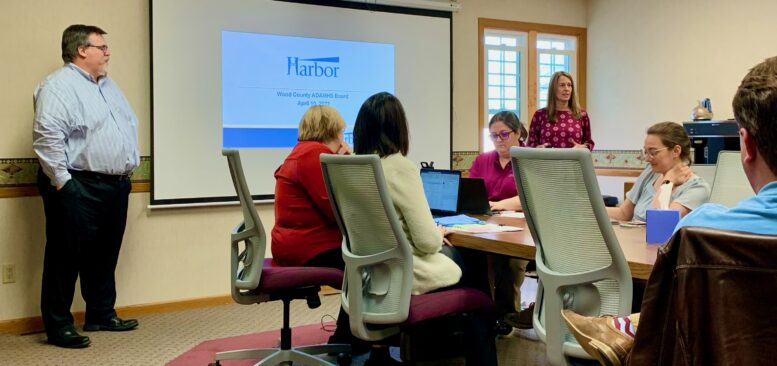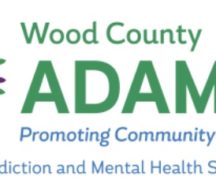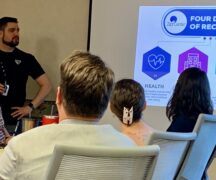By JULIE CARLE
BG Independent News
The Wood County Alcohol, Drug Addiction and Mental Health Services Board allocated $13.7 million for addiction and mental health services in the coming fiscal year, which starts July 1.
The funds which are provided to a multitude of agencies ensure Wood County residents have access to high-quality mental health and addiction services.
Services range from housing options, crisis and mobile stabilization services for children and adults and mental health education, prevention and support services to new and existing programs targeting substance use disorders prevention and treatment and suicide prevention.
“Determining the county’s needs and funding those needs are the board’s primary functions. I was really pleased about the process this year,” said Frank McLaughlin, chair of the county board. “We were more active about vetting some of the proposals and sitting down in advance with all of the vendors.”
With projected revenues of more than $12 million, the board wasn’t able to fund all of the agencies’ requests which totaled over $16 million. Members agreed to utilize some of its reserve funds to fill some of the gap.
“Luckily we have reserve funds to use for some of those special projects,” McLaughlin said. Once the state budget is approved, there are likely to be more funds for programs such as opiate prevention and treatment. “We don’t know exactly what we will get in the end, but even so, this is an ambitious budget.”
The county board’s system of care budget gets most of its revenue from local levy monies totaling $8,600,000. State and federal funding each will add approximately $2 million for local programs and services.
While nearly $3 million worth of projects weren’t included in the allocations, “Our mental health and addiction needs for Wood County residents have been completely met. I feel good about that,” he said.
The agencies which will receive the most funding included Harbor Behavioral Health, $3.6 million; Children’s Resource Center, $2.8 million; Unison Health, $1.7 million.
Among Harbor’s funded programs are the Connection Center, a community residence that provides housing for people with the highest needs, and housing assistance to help individuals with severe and persistent mental illness avoid or transition from homelessness.
Programs funded for the child-focused services of Children’s Resource Center include prevention and crisis programs, the 24/7 residential unit, transportation and family therapy and stabilization programs.
The new Bowling Green Crisis Stabilization Unit and Mobile Crisis Services were among Unison Health’s top-funded initiatives for the fiscal year 2024. The 12-bed, voluntary treatment center opened earlier this year to provide support services and treatment for those dealing with mental health crises. With the Mobile Crisis Services, a team is dispatched whenever behavioral health issues are called into 911 or the county’s crisis line to assess on-site the best and safest next steps. The request includes funds that will provide staffing to ensure access to medications for those in crisis.
Allocations under $1 million included Wood County Educational Service Center, $952,000; Ohio Guidestone, $517,000; Cocoon, nearly $405,000; Zepf Center, $385,726; NAMI Wood County, almost $326,000; Addiction Response Collaborative, $132,000; and H.O.P.E in Fostoria, $13,800.
Special projects totaling over $480,000 included bed days for adult care facilities, a community transition program, assisted outpatient treatment and ambulance transport.
Utilizing a State Opioid & Stimulant Response Grant, the board approved a memorandum of understanding with the Wood County Health Department to fund up to $30,0000 for Bridge Devices. The devices are small electrical nerve stimulators that help individuals kick a drug habit.
They also allocated $101,000 in state funds to set up Narcan vending machines in the county.
Another new initiative for the fiscal year 2024 is a contract with Chess Health to create a new access and engagement point for individuals using drugs or alcohol. The $82,000 contract will provide access to a peer-support network, which has been a gap in Wood County alcohol and drug addiction services. The funds are part of the Ohio Department of Mental Health and Addiction Services’ funding specific to substance use disorders.
“It’s important for the community to know what is going on with their money and that these services are being well funded. With this year’s needs and allocation process, I think we’ve covered all the needs for Wood County responsibly,” McLaughlin said.
In other business, the board elected McLaughlin to serve as board chair; Judy Ennis, as vice chair; Matthew Battiato, treasurer; and Leslie Miller, secretary. The term runs from July 1, 2023, through June 30, 2024.





